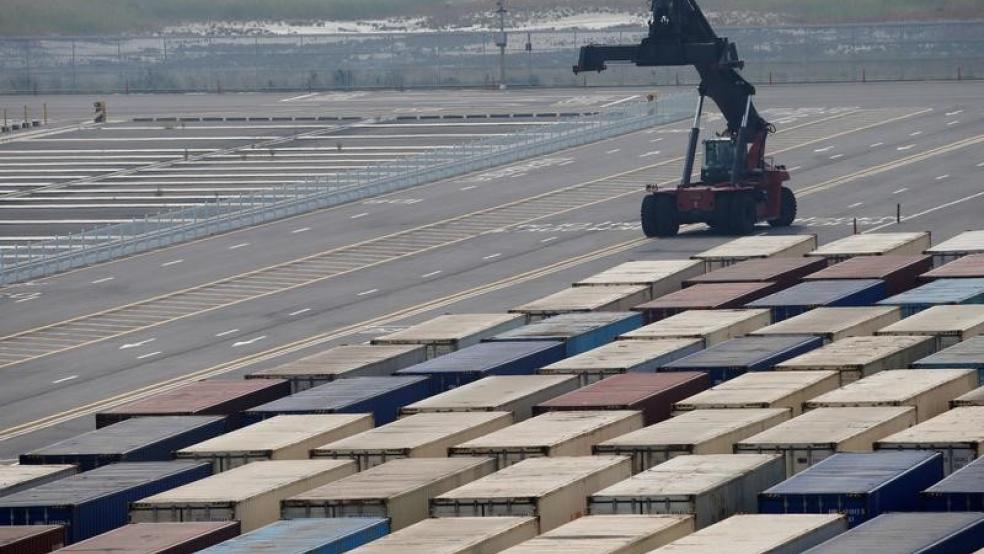Free trade advocates hoping against hope that President-elect Donald Trump might change his mind regarding the Trans-Pacific Partnership trade deal had those hopes shattered Monday night. In his first substantive policy announcement since winning election on Nov. 8, Trump announced that withdrawing from the deal would be his first order of business after his inauguration.
The deal, negotiated over nearly a decade by the U.S. with 11 partners around the Pacific Rim (notably excluding China and Russia), had been languishing in Congress and was denounced by both Trump and his Democratic rival, Hillary Clinton. It was widely viewed as dead in the water barring a spectacular change of heart by the eventual president, and Trump made it clear Monday that isn’t happening.
Related: Trump, on YouTube, Delivers a Message to the Public — and the Media
On his first day in office, Trump said, “I am going to issue our notification of intent to withdraw from the Trans-Pacific Partnership, a potential disaster for our country. Instead, we will negotiate fair, bilateral trade deals that bring jobs and industry back onto American shores.”
The move also raises concerns about whether it will damage U.S. foreign relations and perhaps even global security. U.S. allies like Japan, Australia and New Zealand all spent enormous amounts of time and effort negotiating the deal and the disappointment after Trump’s announcement was almost palpable.
Speaking at a meeting of TPP countries in Peru, Japanese Prime Minister Shinzo Abe said that without the U.S., the TPP “has no meaning.” While the 11 remaining nations will continue working on the pact, the decision by the U.S. to pull out “destroys the basic balance of gains” inherent in the arrangement, Abe said.
The decision will no doubt please many Americans of both parties, who have come to see free trade deals as job killers because they make it easier for U.S. companies to shift production overseas. Free trade advocates insist that the effect on U.S. jobs is overblown, and many are horrified at the idea of the U.S. opting out of a deal that covers such a huge swathe of the global economy.
Related: Who’s Being Left Behind by the Stock Market’s Trump Trade?
Experts warned that the move to negotiate all trade deals on a bilateral basis flies in the face of global trends.
“We’re moving to regional trade blocs. There will be an Asian trade bloc, and the U.S. isn’t going to be part of it,” Kit Juckes, global strategist for Societe Generale said in an appearance on Bloomberg Television.
That has two major implications for the U.S., said Scott Lincicome, an international trade attorney and an adjunct scholar at the Cato Institute, a libertarian think tank in Washington.
“Economically, it excludes the U.S. from the Pacific supply chain,” he said, meaning that U.S. competitors in Asia will enjoy the benefits of a system in which the component parts of different products can move freely and efficiently between parties.
Related: Why Trump May Leave the Federal Reserve Alone – for Now
“Legally, strategically and geopolitically it’s perhaps even a bigger deal,” Lincicome said. “The TPP was seen as the launching point for 21st century commitments on all sorts of relatively new trade issues like e-commerce and genetically modified organisms. There were new provisions on labor, environmental rules, new discipline on state owned enterprises.
“Well, by leaving the TPP and by TPP perhaps dying, U.S. leadership on those 21st century issues goes away,” he added. “The only people taking up the mantle are likely to be less free-market oriented than the United States.”
And at a time when China is proving increasingly aggressive, both economically and militarily, there are also serious questions about the effect the withdrawal might have on security policy. While the deal itself does not touch on issues like national defense, many senior defense figures see strengthened economic ties as a natural complement to military alliances.
Last April, Defense Secretary Ash Carter said, “In terms of our rebalance in the broadest sense, passing TPP is as important to me as another aircraft carrier ... It would deepen our alliances and partnerships abroad and underscore our lasting commitment to the Asia-Pacific ... And it would help us promote a global order that reflects both our interests and our values.”
Related: The Latest Republican Trick to Roll Back Obama’s Rules
Now, some worry, the U.S. has effectively ceded the territory to China, which has been pushing its own comprehensive trade deals in the region, the Regional Comprehensive Economic Partnership and the Free Trade Area of the Asia-Pacific, which would include Russia.
There’s more than a little irony in the fact that Trump is the person who delivered the coup de grace to TPP.
Throughout his campaign, he railed against China for what he described as unfair trade practices and currency manipulation. But one of the key reasons why China was left out of the TPP was to put pressure on Beijing to bring its policies more in line with global standards. Now, with the deal effectively dead, the leverage over China disappears, and it becomes Beijing rather than Washington that wields the most influence over future deals.





